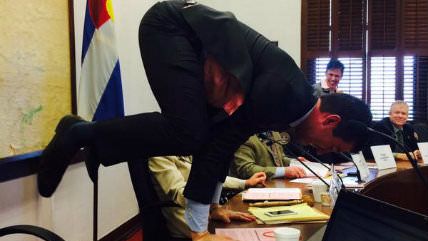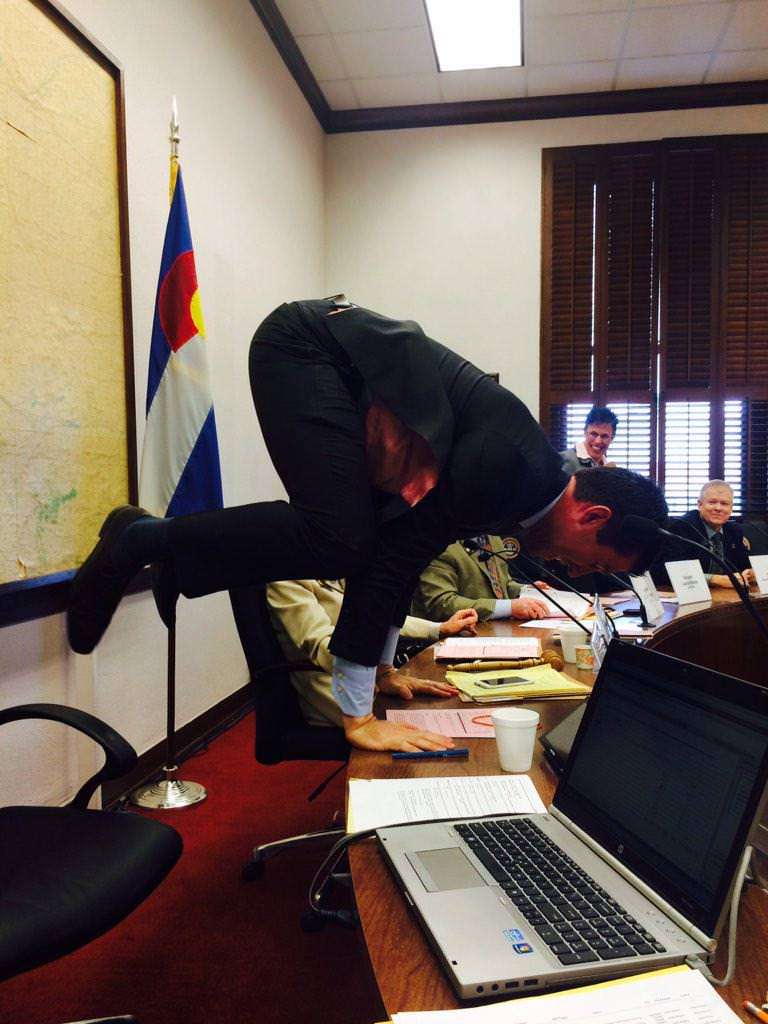A Strike Against State Regulation of Yoga Teachers in Colorado
Bill would exempt yoga teacher training schools from costly state certification


Hooray for Colorado lawmakers who aren't that worried about yogis learning crow pose in a non-state-approved manner. Last week, a state Senate committee approved a bill to exempt yoga-teacher training centers from burdensome certification requirements and fees imposed by the state Division of Private Occupational Schools (DPOS).
"For years, the yoga teacher training schools have been operating without government intervention," said state Sen. Laura Woods (R-Arvada), who introduced the legislation, Senate Bill 186*. "In all those years, we do not know of a single complaint against the yoga teacher training schools."
Yet under DPOS' requirements, passed in 2002, yoga-teacher training schools must be certified by the state, at a cost of $1,750 for the first two years and $1,500 every three years after that. Additional fees must be paid per student per quarter, and for every school "agent" authorized to enter into contract with students. And schools must also secure a minimum bond of $5,000. Enforcement of these requirements was lax until last fall, when one yoga teacher complained that only six of the state's schools were in compliance. DPOS responded by mailing letters to 82 training schools.
The backlash from yogis was swift. Nonprofit trade group The Yoga Alliance began lobbying against the regulations, and local yoga studios and teachers protested. "The state is trying to create a solution where there is not a problem," yoga instructor Nancy Levinson told the Denver Post.
Under S.B. 186, which passed the Senate education committee last Wednesday and now heads to the appropriation committee, yoga teacher training schools would be exempt from DPOS oversight. State law requires the agency to regulate private schools that charge tuition for occupational programs. But Sens. Woods and Dore argue that yoga teacher training is "avocational," meaning it is "designed to facilitate the personal development of individual persons … and not conducted as part of a program or course designed with the primary objective to prepare individuals for gainful employment in a recognized occupation."
* Originally stated that Woods co-sponsored bill with Tim Dore; Republican Rep. Dore actually introduced similar legislation in the House.
Editor's Note: As of February 29, 2024, commenting privileges on reason.com posts are limited to Reason Plus subscribers. Past commenters are grandfathered in for a temporary period. Subscribe here to preserve your ability to comment. Your Reason Plus subscription also gives you an ad-free version of reason.com, along with full access to the digital edition and archives of Reason magazine. We request that comments be civil and on-topic. We do not moderate or assume any responsibility for comments, which are owned by the readers who post them. Comments do not represent the views of reason.com or Reason Foundation. We reserve the right to delete any comment and ban commenters for any reason at any time. Comments may only be edited within 5 minutes of posting. Report abuses.
Please to post comments


May the Schwartz be with you, yogis. Oh wait, that's Yogurt.
Yogurt! I hate yogurt! Even with strawberries.
Hugh, I am your father's brother's nephew's cousin's former roommate.
So what does that make us?
Absolutely nothing! Which is what you are about to become.
I have a good friend who just did a Yoga training school. I'm slightly concerned that he has joined a weird cult.
A weird cult full of smoking hot women who are in touch with their libidos. Its a goldmine for single people looking to meet other attractive singles.
He's married. To a fairly wealthy woman. I think he was looking for some more purpose in life or something. Must be nice not to have to be concerned about actually making a living on your career path.
I don't know about career path. The lady who owned the studio I went to has essentially trained everyone in that town and has 4x the space she started with and her classes are still packed. I think they do pretty well. Teaching for a flat fee is a tough way to make rent though.
If I were married to a wealthy woman I would do the same thing !
You're thinking of Crossfit, Zeb. Totally different.
Oh. Well, that's a relief.
Let's do Yoga!
So should we be happy that having a large enough, rich enough demographic can overcome bureaucracy or sad that this case got attention for being an outlier in the creep of government licensing?
Both?
I only ask because I know a lot of people in the craft beer industry in FL that are having a similar fight over growlers and tap sharing. I'm pretty sure that they wil beat the distributors lobby this year, but getting them to see regulation as a systemic problem is an uphill fight.
I only ask because I know a lot of people in the craft beer industry in FL that are having a similar fight over growlers and tap sharing. I'm pretty sure that they wil beat the distributors lobby this year, but getting them to see regulation as a systemic problem is an uphill fight.
Exactly. While it is good that they have escaped, an oppressive rule with many exceptions for favored constituencies is actually worse than oppressing everyone equally because it is less fair to the unfavored and more likely to drag on forever since the powerful got what they wanted already.
Yeah, I was annoyed to see some of the yoga folks arguing why they're not like this or that other group (haidressers, etc.) that *should* be regulated.
The sad state of Yoga in the United States is reflected in the fact that these yogin didn't argue that as yoga is the expression of a Dharmic path to spiritual enlightenment, then Colorado has no more business regulating yoga instruction schools under occupational licensing laws than they do seminaries or schools of Divinity, of which they should more resemble.
But they don't.
I disagree. I think punching loopholes in things causes them to fall apart faster, if anything. Worse is worse, not better.
"The state is trying to create a solution where there is not a problem,"
Gee, that sounds familiar...FCC anyone?
Dore, is a Republican, and a Representative not Senator.
Corrected. Thank you.
"Rep. Dore (R-Denver) actually introduced companion legislation in the House."
Dore is from eastern Colorado (Elizabeth), and he's the House sponsor of SB 186, not a sponsor of companion legislation.
/picking nits
And he prefers chocolate over vanilla.
That ass, adorned in yoga pants, you did not train it.
Nonprofit trade group The Yoga Alliance began lobbying against the regulations, and local yoga studios and teachers protested. "The state is trying to create a solution where there is not a problem," yoga instructor Nancy Levinson told the Denver Post.
So what's going on here? Nine times out of ten, it's the trade groups and "alliances" that demand these regulations as barriers to entry, keeping the competition limited.
If this Yoga Alliance lobbied against the regulations, who lobbied to get them passed?
But Sens. Woods and Dore argue that yoga teacher training is "avocational," meaning it is "designed to facilitate the personal development of individual persons
This seems like utter crap. "Avocational"? Aren't they training people to instruct others under the premise that that instruction will generate income for the trained?
CAVEAT: Occupational licensing regulations are all bullshit.
Along with Uber and mobile food trucks, we can add yoga to the proggie regulation exception list.
Everything else, however, must be regulated to the hilt or there will be CHAOS.
If you have the commitment and resolution to be healthier in 2014, you might try yoga. During this time, yoga is often marginalized as a form of exercise because it invisible se-more intense exercise such as jog, jog, or exercise at the gym and visit on http://www.yogaburn-reviews.com .However, do not underestimate the health benefits that can be provided by yoga. Sports that this one will surprise you with a variety of health benefits that you did not know before. Intrigued by what benefits can be given yoga for health? Listen friends, as reported by App for Health